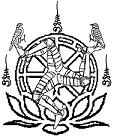If you know you are dear to yourself, then be on guard, thoroughly protected.
In any of the three watches of the night, the wise are observant.
158.
First of all one should become established in what is suitable.
Then they can instruct others, the wise are not impure.
159.
If one would act in the way they advise others.
One who is well restrained can teach others, as we are difficult for ourselves to tame.
160.
We are our own protector's, as who else would (definitely) protect us.
When we ourselves are well restrained, we have a protector hard to get.
161.
Crimes are done by ourselves, brought into existence by and originate from ourselves.
These destroy the fool, like a thunder bolt a hard gem.
162.
When you are extremely corrupted, (you are like a) Māluvā creeper strangling a Sala tree.
You act in such a way to yourself, just like an enemy would wish for them.
163.
Easy to do are unskilled and useless for oneself.
Very difficult are acts that are skilled and useful to do.
164.
Those teachings of the worthy, noble, and living uprightly,
The fool shows disdain toward, relying upon dissident perspectives,
Its outcome is like the fruit of the Kāshta read, only for their own destruction.
165.
Malevolence is done by oneself; (through acting from there) one becomes defiled.
Beneficence is done by oneself; (through acting from there) one becomes pure.
Whether an act is pure or defiled depends upon oneself, no one can purify another.
166.
Do not neglect your own spiritual care for that of another's, no matter how great.
Knowing what oneself needs, practice for your own well-being.


 RSS Feed
RSS Feed
